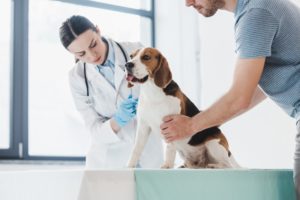 Veterinarians are often asked to provide expert advice and care for both humans and animals. The veterinary profession is complex and ever-changing, so it’s important that veterinarians have a comprehensive understanding of all areas of veterinary medicine. This article will provide an overview of the role of veterinarian in the modern world, including discussions on animal health and welfare, cost-effectiveness, and professional ethics. Our website provides info on Veterinarians near me
Veterinarians are often asked to provide expert advice and care for both humans and animals. The veterinary profession is complex and ever-changing, so it’s important that veterinarians have a comprehensive understanding of all areas of veterinary medicine. This article will provide an overview of the role of veterinarian in the modern world, including discussions on animal health and welfare, cost-effectiveness, and professional ethics. Our website provides info on Veterinarians near me
The veterinary profession is responsible for the care and treatment of animals from pre-natal to old age. Veterinary medicine is used to diagnose, treat and prevent diseases in animals. In addition, it provides important services such as animal husbandry, food production, research and education.
Veterinarians play a vital role in the world by providing medical care to millions of animals each day. They work in many different industries including agriculture, food production, industry, public health and veterinary hospitals. They also play an essential role in human health through their work on vaccines and other medical treatments.
There are currently over 1500 veterinary hospitals worldwide that offer various healthcare services to patients from pre-pregnancy through old age. These hospitals can provide diagnosis, treatment and Prevention services for a variety of animals including humans. Additionally, many veterinary clinics offer a wide range of Wolf care products as well as other pet supplies and equipment.
Veterinarians use a wide range of veterinary drugs and pharmaceuticals to treat a variety of animals from pre-natal through old age. This includes treatments for sick or injured animals, as well as preventative measures for human health. Many veterinary drugs are also used to diagnose and treat diseases in humans.
The clinical process of veterinary medicine is the process by which a veterinarian treats patients. Thisincludes diagnosis and treatment of disease, as well as accident and emergency care.
The role of veterinary medicine in the prevention and treatment of disease is to diagnose and treat diseases before they cause any harm to humans or other animals. Veterinary medicine also plays an important role in the diagnosis and treatment of disease in humans, helping to identify causes and potential treatments for diseases.
In order to prevent disease from spreading, veterinarians work with their patients to develop effective preventative measures. These measures may include administering antibiotics when necessary, providing safe food or water for animals, vaccinating against certain diseases, or performing surgery on animals if needed. In addition, Veterinarians play an important role in the development and implementation of public health policies that impact animal populations. For example, many cities have ordinances that regulate how much time dogs can be left out during day or nightime; this helps reduce animal cruelty by preventing dog owners from leaving their dogs outside for too long).
Veterinarians use a variety of techniques to diagnose diseases. These techniques may include searching through body tissues for signs of infection, examining blood samples for trace elements or biomarkers associated with disease, palpating muscles for massage sensitive signals associated with inflammation or illness, or radiographs to show changes in organs or tissues related to disease (for example tumors).
In order to provide rapid relief to injured animals, veterinarians often use advanced medical technology such as nasogastric tube feeding (NGF), ultrasound guidance therapy (USG), endotracheal intubation (ETI), 7-day life support (7 DLS), short-term mechanical ventilation (SBVM), epidural catheterization (EPI), epidural local anaesthesia (EA) or percutaneous transluminal adventitial exploration/repair (PTAR) via femoral artery catheterization/small incision approach Additionally, some veterinarians also utilize prophylactic antibiotics following accidents in order to protect human beings from infections that might occur as a result of the accident.
Veterinarians play an important role in the practice of veterinary medicine. They provide care for animals, diagnose and treat medical problems, and perform other critical tasks in the veterinary setting. In order to be a successful veterinarian, you must have a strong understanding of both human and animal diseases and be able to communicate effectively with your patients.
In the practice of veterinary medicine, you must complete a four-year undergraduate degree in veterinary medicine or a related field. After completing your undergraduate degree, you must pass avetical surgery exams and earn a license to practice as a veterinarian. You can also become certified in animal behavior, food science, and podiatric medicine through accredited program or by passing an examination given by the American Veterinary Medical Association (AVMA).
In the post-disease care process, veterinarians work with their patients to ensure that they are treated properly and that their conditions are managed as safely as possible. This includes managing any associated health concerns such as medications, feedings, sheltering, and communication with family members. Once all necessary treatments have been administered, veterinarians continue to monitor patients until they reach their final destination or until their illness has resolved completely.
The Veterinary Industry is a vital part of the global economy. It provides essential services to both humans and animal populations. The Veterinary Profession offers many opportunities for careers in the field, including treating animals in the clinic, preventing disease, and diagnosing and treating diseases. In addition to providing necessary services to society, veterinarians also play an important role in post-disease care by providing support to patients and their families. Thanks to their skills and work, the veterinary profession is growing rapidly around the world.
Tags: Veterinarian